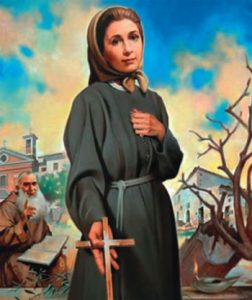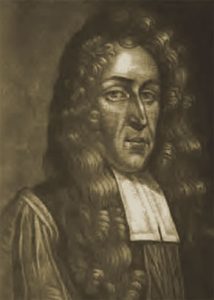July Saints
 Blessed Teresa Manganiello (1849-1876)
Blessed Teresa Manganiello (1849-1876)
Teresa Manganiello was born in Montefusco, southern Italy, in January 1849. The youngest of eleven children, she never went to school. Like many peasant children of her time, she worked in the home and in the fields. At age 21, she was clothed in the Franciscan tertiary habit and the following year she made her vows, taking the name Sister Mary Louise.
Teresa was noted for her friendly manner, the love she held for all people, and the way she took in and nursed those who needed assistance. Teresa had an innate ability to put herself in the place of others and was always concerned about the poorest, in both the material as well as the spiritual sense. She never refused help to anyone who came to her. Besides distributing food and clothing, she ran a sort of rudimentary pharmacy with herbs she cultivated for minor illnesses current at the time.
She undertook a life of penance similar to that of St Francis and was misunderstood because of it. She also practised great mortifications and physical penances because, she said, “the Lord asks it of me.” Her time of prayer took priority over everything else and no extreme of weather could prevent her from walking three kilometres each day to the nearest church.
Although uneducated and illiterate, her consecration to God and her devotion to prayer resulted in a wisdom which could only be described as supernatural. She could neither read nor write, but she retained everything she learned. She had a spirit of contemplation which enabled her to meet people with simplicity and yet amaze learned persons with her theological wisdom.
At age 27, Teresa contracted tuberculosis, which put paid to her dream of starting a religious congregation dedicated to Our Lady. Five years after her death in 1876, however, her spiritual director was able to bring this dream to fruition by founding the Franciscan Immaculatine Sisters, whose mission is to educate youth, particularly girls, and to assist with catechesis and parish work.
Blessed Teresa, inspire us to be always concerned for the poorest in our society.
(Source: Internet – various)
 Blessed Richard Langhorne
Blessed Richard Langhorne
(c.1624-1679)
Richard Langhorn was an English barrister who had acted as legal adviser to the Jesuits at a time of acute anti-Catholic hysteria.
When, in October 1677, Titus Oates was expelled from the English College at St Omer “for serious moral lapses,” Richard’s son Charles entrusted Oates with a letter to his father. Oates returned with a letter from Richard thanking the Jesuits for all they had done for his sons.
When Oates and Israel Tonge concocted a fictitious ‘Popish Plot’ in September 1678, four priests were arrested, as was Langhorne. Oates claimed that Langhorne’s earlier correspondence dealt with treason. Richard was imprisoned at Newgate without any other evidence.
Richard had to defend himself, as being charged with treason, he had no right to defence counsel. His witnesses were shouted down in court. The Lord Chief Justice, although prejudiced against Catholic priests, was more tolerant of Catholic laymen; his summing up was fair by the standards of the time, and he warned the jury that on no account should an innocent man’s life be taken away. Nonetheless Langhorne was found guilty. He received a month’s reprieve to tidy the affairs of his clients and was executed at Tyburn, London, on 14 July 1679.
Blessed Richard, help us to remain at peace when accused unjustly.
(Source: wikipedia.org)
 Saint Bruno of Segni
Saint Bruno of Segni
(1049-1123)
Bruno was born to the Italian nobility. He studied theology at the Benedictine monastery of Saint Pepetuus at Asti and became a Benedictine, monk.
He was ordained in 1079, and assigned to a parish at Siena. Noted for defending orthodox Church wisdom, his knowledge of Scripture, and his teachings on the Blessed Sacrament, he was Counsellor to four popes. Ordained bishop of Segni, in 1080 by Pope Gregory VII, he fought simony and lay investiture.
In 1095 he retired to a monastic life at Monte Cassino where he was elected abbot in 1107. Following a chastisement from the pope for shirking his duty to others, he was soon ordered back to his diocese, a vocation he fulfilled until his death. He was a Vatican librarian, Cardinal legate, though he declined the cardinalate, and wrote several works on theology.
Saint Bruno, help us to defend our Catholic faith in all circumstances.
(Source: www.catholicsaints.info)
 Entries(RSS)
Entries(RSS)